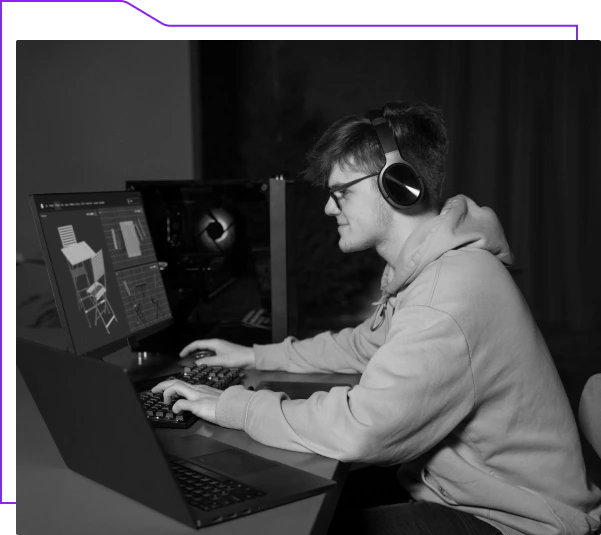University Programs
Location:
Bucharest
DURATION:
3 Years
LANGUAGE:
English
DIPLOMA:
Game Developer Degree
ACCREDITATION:
UK Diploma
START DATE:
September 2024
Success Celebration Discount (until 15 July):
1500€
Late Registration Discount (until 15 August):
1000€
Game Design and Development
Discover the captivating art of video game design and development! Learn to create remarkable interactive experiences, combining advanced technical skills with creativity and engaging storytelling.

Year 1
Narrative Design
The module will introduce students to the knowledge, processes and techniques necessary to formulate and explore effective, innovative game ideas with consideration for the structure of both gameplay and narrative design
- Describe and practice the techniques and processes required to effectively form, develop, and design games.
- Demonstrate a considered design process and awareness of the key conceptual, audience, and cultural models that can impact on game design.
- Create game design documentation and artefacts that reflect the processes utilised across the mainstream games industry and emergent development communities.
Level Design and Scripting
The aim of this module is to provide the student with the theoretical, practical, and technical knowledge
required to utilise game engines and operate as an effective level designer.
- Utilise core game engine functionality and tools for game development.
- Develop custom logic and entities for use in game development.
- Demonstrate an appreciation for level design theory through the development of game levels utilising a prominent game engine.
Game Economy Design
- Become familiar with the differences between free to play, monetization and in-game purchases.
- Learn about various in-game currencies, from hard to soft to character experience.
- Understand how motivation works in relation to governing rules of economy (gainers vs spenders) and how to define a motivation chart.
- Learn how a game’s economy and currencies cand help guide a player’s progression in the game.
Being Successful at University
Every student that enters university will have different strengths and challenges in their academic, personal, and social abilities. This microcredential will support you in successfully joining ECHO School, helping you to achieve success. Each topic will start with questions for you to identify which areas of the topic you should focus on.
- Identify appropriate student behaviours and habits for success at university
- Use appropriate university approaches to academic writing and referencing
Media Production
- Work as part of a team and undertake a specific role in the production of an interactive prototype.
- Iteratively produce assets and documentation in support of an entertainment product.
- Reflect upon and present the challenges and issues in collaborative media development.
User Experience
- Utilise relevant user experience research methods to produce desired design outcomes.
- Justify and reflect on design decisions based on user experience research as well as existing literature on visual communication, user experience, interface and interaction design.
Game Development Management
- A solid introduction into game production with a focus on the development process.
- Learn critical skills needed to manage the game’s development, but also the team implementing it.
- Understand how success is measured, how KPIs are created and tracked during the life cycle of a game.
Year 2
Gameplay and Systems Balancing
In this module students will focus on the development of compelling gameplay systems. This will be done through development of both the technical and creative skills required to design game mechanics as well as a theoretical understanding of what constitutes a compelling numeric gameplay system. In implementing gameplay students will deploy rapid prototyping to plan and develop engaging game mechanics in modern game engines. Students will also consider wider systems design, incorporating the analysis of player data, to design engaging systems with considered rates of progression, resource acquisition and achievement for players.
- A solid introduction into game production with a focus on the development process.
- Learn critical skills needed to manage the game’s development, but also the team implementing it.
- Understand how success is measured, how KPIs are created and tracked during the life cycle of a game.
Production and Leadership
This module develops an in-depth understanding of the issues around the production process and managing a creative team.
- Explain the issues relating to keeping a team of creative individuals content and productive.
- Analyse and evaluate techniques and practices to keep a team project on time and within budget.
- Know how to analyse and evaluate the risks associated with a development, and to classify and control these risks.
- Describe and discuss a range of current business models that underpin and drive media production and distribution.
- Critically analyse a variety of legal, moral and ethical issues affecting the creative industries.
Game Design Practice
The field of game design encompasses a breadth of specialist roles and applications. In this module, students will be supported to identify their own areas of interest and professional specialisation, taking into account factors such as game genres, audiences, platforms, technologies, and content. With the support of the tutor, students will research game design practice and develop a PDP targeted at skill and portfolio development.
- Research contemporary areas of game design practice, identifying roles, responsibilities, required skills, and relevant bodies of knowledge.
- Identify an area of personal interest within the field of game design, and devise a personal development plan founded upon a skills audit.
- Undertake a specialist project following self-directed tutorials and reading, leading to the generation of a portfolio of new game design work.
- Demonstrate the ability to assess and communicate one’s own development, and to devise effective strategies for ongoing personal improvement.
Multidisciplinary Project
For this module, students will be required to work together on an interactive media project as part of a multidisciplinary team. Individual students will be expected to contribute to their team by taking on a professional role suited to their area of study. As part of the module, all students will be expected to: communicate with clients and relevant stakeholders; participate in pitching and presentations; research and test technical pipelines; create project documentation and planning materials; and contribute to the iterative design and development of a final interactive prototype.
- Contribute to the full pre-production lifecycle of a defined interactive media project including ideation, iterative development, testing, enhancement, completion and delivery of a functional prototype that constitutes a vertical slice of functionality.
- Demonstrate the ability, comparable to that of a professional practitioner, to integrate their own contributions with those of a multidisciplinary team to deliver, together, a cohesive and functional end-product.
- Demonstrate teamwork, appropriate communication skills, and the ability to interact with all stakeholders, including fellow team members, clients, mentors, and academic tutors in a professional, respectful and productive manner throughout the production and delivery of a team project.
- Explain the issues relating to keeping a team of creative individuals content and productive.
Year 3
Honours Project Proposal and Development
This module will allow students to formulate a contextual, theoretical, and practical foundation in a self- selected area of professional practice and research. Students will evaluate existing research, texts, and projects with a view to developing a project proposal, and will develop a portfolio of practical work pertinent to their own professional practice and the selected Honours Project topic.
- Undertake critical and effective information retrieval, analysis, and organisation.
- Review, discuss, and apply key theories and existing literature from appropriate sources to the domain of practice.
- Demonstrate critical self-awareness, reflective practice, and an inquiring, creative, and analytical approach to the development of an appropriate portfolio of work.
- Identify creative, technical, and professional skills to tackle an identified creative project, and demonstrate the ability to carry out autonomous skills development and evaluation.
- Demonstrate the ability to develop pre-production, planning, and proposal materials for a creative project and dissertation.
Creative and Cultural Industries
This module requires students to engage critically with historical and contemporary issues within the creative and cultural industries (CCI). Students should expect to discuss: the local, national, and global marketplace for creative media; insights and issues related to the creation, distribution, and consumption of creative media; and demonstrate knowledge, expertise, and planning expected by employers and investorsanalysis of industry-based phenomena and issues. Students should consider which creative industriesCCI align with their own personal ambitions, and develop an understanding of, and strategy in approaching, their chosen route of professional practice.
- Demonstrate a critical understanding of the social, cultural, and economic factors that impact upon operations, professional practice, and entrepreneurship within the creative industries.
- Identify and discuss the current challenges within a selected creative industry.
- Demonstrate capacity and preparedness to propose strategies in dealing with issues through creative practice within the creative and cultural industry.
Client-based Project
- Manage and deliver a major research project that demonstrates critical engagement with their selected subject and that seeks to address self-selected research questions.
- Produce a body of work that evidences technical, creative, and professional skills in line with their identified discipline and future practice in the creative industries.
- Analyse and critically interpret their research and practice in the context of the subject domain and existing knowledge.
- Effectively communicate their critical engagement with the subject and the findings of their research.

What you can achieve
Potential Careers
This specialized program equips graduates with a unique blend of creative, technical, and problem-solving skills, essential for thriving in the fast-evolving gaming industry. From designing immersive environments and crafting compelling narratives to programming intricate gameplay mechanics and developing cutting-edge graphics, students are prepared to tackle various roles. Potential careers span across game design, development, and production, including positions as:
- Game Designer
- Game Economy Designer
- Level Designer
- UX Designer
- Producer

Admission
Admission Criteria
Whether you’re a high school graduate or a transfer student, our comprehensive admission process evaluates your skills, creativity, and potential to thrive in this dynamic field. Join us to start your journey in becoming a skilled game developer, ready to innovate and lead in the gaming industry.
- Admission Form
- Personal statement. Find more info in the link.
- Along with your Personal statement please send us this filled Interest form.
- Academic Interview
- Industry Interview
- BAC, a minimum average grade of 7.5
- English Language Test Result, a minimum score of CEFR B2
Game Engineering
Explore software engineering for games. Learn the utility of advanced programming and the experience of optimizing performance testing. Build the future of gaming with your skills!

Year 1
Data Structures and Algorithms - 1
Building on students’ knowledge of programming facilities taught in Level 7 programming modules (e.g. arrays, structures, simple collections), this module introduces the standard data structures and algorithms that form the core of algorithmic thought in computer science, and introduces students to the idea of reasoning about the behaviour and performance of a computer program.
- Describe abstract and concrete requirements for data structures and algorithms.
- Describe a range of standard data structures and algorithms, in terms of both functionality and performance characteristics.
- By reasoning about behaviour and performance, be able to critically select appropriate data structures and algorithms for a given application within a software project.
Games Programming
- Explain the processes involved in developing software for computer games.
- Describe the core elements of computer organisation common to all modern games systems.
- Apply development tools to the creation of computer games applications.
- Apply the structure of a games application.
- Develop a 2D games application.
Mathematics for Game Engineering
- Solve algebraic problems using trigonometric, exponential and logarithmic functions.
- Solve two-dimensional geometric problems involving straight lines and circles.
- Use matrix and vector algebra proficiently.
- Use matrix transformations for standard geometric operations in 2-D computer graphics.
- Use the basic kinematics equations to solve problems in dynamics.
- Formulate and use transformation matrices (2-D & 3-D) for standard transformations and projections.
- Determine equations for lines and planes in 3-D, using them to compute distances, projections and intersections.
- Perform collision detection calculations of rays with boxes and spheres.
- Apply Newtonian concepts involving momentum, impulse and energy to formulate and solve resulting models.
Data Structures and Algorithms - 2
This module builds on Data Structures and Algorithms 1 by introducing students to parallel programming on shared memory and GPU architectures and the design
techniques underpinning parallel applications, using a range of case studies drawn from typical real-world applications.
- Be aware of the standard techniques of software performance measurement, including profiling, and apply these techniques to identify performance bottlenecks in real programs.
- Understand the emerging importance of parallel programming in modern software development, and experiment with the performance impact of parallelising parts of an application.
- Describe a variety of application-specific algorithms (sorting/numerical/image processing) and associated data structures in common use, and discuss the benefits and limitations of parallelisation.
Graphics Programming
This module provides an introduction to the principles of 3D graphics programming. Students will develop application that demonstrates real-time 3D graphics.
- Demonstrate the fundamentals of 3D computer graphics.
- Design and develop real-time 3D graphics applications.
- Describe and explain 3D graphics techniques.
Game Programming and System Architectures
This module builds on Graphics Programming, Data Structures and Algorithms 1 and Computer Architecture and introduces the necessary components needed to develop a 3D physics-based game application considering the hardware.
- Describe 3D graphics, audio and physics functionality within a 3D games- application.
- Collaboratively implement key game components - 3D graphics, audio, gameplay and physics on games console hardware.
- Design, implement and evaluate applications that demonstrate optimised performance in relation to device hardware e.g. by using multithreading.
Year 2
Graphics Programming with Shaders
This module develops a critical understanding of the computer graphics programmable pipeline and various graphics techniques. Students will develop and evaluate techniques used to manipulate 3D graphics in real-time.
- Develop custom shaders.
- Design and develop real-time 3D graphics applications, demonstrating use of the programmable pipeline.
- Evaluate graphics programming techniques utilised.
Gameplay Mechanics Development
This module develops a critical understanding of the principles of formalising, implementing, testing and iterating on functional game mechanics applied in the context of a game engine.
- Create and evaluate code design extrapolated from design documentation.
- Implement functionality within a game engine with testing, metrics and iteration in mind.
- Design, develop and critically evaluate a complex game mechanic within a games application.
Network Systems for Game Development
This module develops a critical understanding of the principles of computer networks as they are applied to the development of various types of networked computer games. Students will develop and evaluate the techniques used to implement networked computer games with a particular emphasis on real-time fast action games.
- Critically evaluate network architectures and protocols for use in games development.
- Assess and select development methodologies for networked computer games.
- Assess and critically evaluate methods for dealing with the unpredictability of network conditions.
- Design, develop and critically evaluate a fast-action network computer game application.
Artificial Intelligence
This module provides an introduction to some of the many Artificial Intelligence techniques which are currently, or could in the near future, be used to enhance the development of intelligent systems applied to various application domains.
- Develop a critical understanding of AI techniques and technologies.
- Evaluate the use of AI technologies and techniques in computer games.
- Design and evaluate a suitable ML solution for a data-driven problem.
Multidisciplinary Project
For this module, students will be required to work together on an interactive media project as part of a multidisciplinary team. Individual students will be expected to contribute to their team by taking on a professional role suited to their area of study. As part of the module, all students will be expected to: communicate with clients and relevant stakeholders; participate in pitching and presentations; research and test technical pipelines; create project documentation and planning materials; and contribute to the iterative design and development of a final interactive prototype.
- Contribute to the full pre-production lifecycle of a defined interactive media project including ideation, iterative development, testing, enhancement, completion and delivery of a functional prototype that constitutes a vertical slice of functionality.
- Demonstrate the ability, comparable to that of a professional practitioner, to integrate their own contributions with those of a multidisciplinary team to deliver, together, a cohesive and functional end-product.
- Demonstrate teamwork, appropriate communication skills, and the ability to interact with all stakeholders, including fellow team members, clients, mentors, and academic tutors in a professional, respectful and productive manner throughout the production and delivery of a team project.
- Explain the issues relating to keeping a team of creative individuals content and productive.
Year 3
Applied Game Technologies
Through a series of lectures and practical sessions, students will be exposed to emerging technology trends used in computer games development and develop and apply techniques using existing technologies to explore these trends.
- Identify and critically evaluate the use of emerging technologies within computer games development.
- Collaboratively demonstrate and critically evaluate the application of existing and emerging technologies through application development.
- Investigate appropriate areas of research and conceptualise their use within computer games development.
- Explore potential new areas of technological development based on current trends.
Tools Programming
This module develops a critical understanding of the principles, practices and techniques in tool development. Students will develop and evaluate software tools with particular emphasis on tools addressing the needs of the game industry.
- Assess, select and critically evaluate platforms and methodologies for tool development
- Describe and utilise databases, 3D models and bespoke assets as part of tool development.
- Critically evaluate and synthesise workable user interactions as part of tool development.
- Design, develop and critically evaluate a tool application designed to operate on game pipeline data.
Audio Programming
An introduction to the theory and practice of digital audio and music for games programming students.
- Explain how audio and music are represented in digital form, and how this relates to human perception of sound.
- Understand and apply digital audio production and processing techniques used in games contexts.
- Implement and critically evaluate audio and music components within a games application.
Client-based Project
- Manage and deliver a major research project that demonstrates critical engagement with their selected subject and that seeks to address self-selected research questions.
- Produce a body of work that evidences technical, creative, and professional skills in line with their identified discipline and future practice in the creative industries.
- Analyse and critically interpret their research and practice in the context of the subject domain and existing knowledge.
- Effectively communicate their critical engagement with the subject and the findings of their research.

What you can achieve
Potential Careers
Embarking on a career path with a diploma in game engineering opens a world of exciting and diverse opportunities for graduates. From game development and design to programming and project management, the knowledge and experience gained through this program prepare students for roles that push the boundaries of interactive entertainment. Graduates can look forward to potential careers as:
- Engine Programmer
- Server Engineer
- Network Programmer
- Gameplay Programmer
- Graphics Programmer

Admission
Admission Criteria
Whether you’re a high school graduate or a transfer student, our comprehensive admission process evaluates your skills, creativity, and potential to thrive in this dynamic field. Join us to start your journey in becoming a skilled game developer, ready to innovate and lead in the gaming industry.
- Admission Form
- Personal statement. Find more info in the link.
- Along with your Personal statement please send us this filled Interest form.
- Academic Interview
- Industry Interview
- BAC, a minimum average grade of 7.5
- BAC, a minimum grade in the math test of 7.5
- English Language Test Result, a minimum score of CEFR B2
*It is mandatory that mathematics should be one of the subjects at BAC
Computer Arts and Animation
Learn everything you need to know about the captivating universe of art and animation! Learn to create remarkable artistic elements, bring animation to life, and design visually, using graphic tools and animation technology.

Year 1
3D Asset Creation
This module will introduce students to 3D asset creation, providing them with the knowledge and skills required to design and build their own 3D assets for games in a production setting. By developing abilities and awareness within the field of 3D art asset creation, students will create their own strategies for independent learning within this broad subject area.
- Create 3D digital assets for specific underlying developmental and artistic goals.
- Demonstrate the ability to create and present 3D game assets for application in a game engine.
- Dissect visual reference and research to enhance the authenticity and inform the creation of virtual 3D assets.
- Deliver a portfolio of 3D game assets that demonstrates an appreciation of how artwork should be prepared and presented to prospective employers.
Technical Art Applications
This module is designed to introduce students to a range of technical art practices in media production. Within the module students will study technical art pipelines, rigging, scripting and working in real-time media production software. Students will compile a portfolio of work which demonstrates their engagement with technical art practices.
- Develop technical knowledge appropriate to the production of technical art outcomes.
- Demonstrate understanding of the requirements of the technical artist in production pipelines.
- Utilise iterative practice and critical thinking in the creation of technical art outcomes that are fit for purpose.
Fundamentals of Animation
The module is designed to introduce students to the mechanics of motion and the art of 2D animation. Through a combination of hands-on exercises, lectures, and discussions, students will learn the 12 principles of animation, as well as fundamental principles of physics, and the role of anatomy and form as they relate to animation. They will also develop skills in using hand-drawn animation techniques and analysis of existing motion to create a series of simple animations. The course will also explore the use of motion in different contexts and encourage students to apply their knowledge and skills in the creation of a final original animation concept. By the end of the module, students will have a strong foundation in the basics of 2D animation and the ability to analyse and evaluate motion in their own and others’ work.
- Utilise traditional drawing techniques to understand and apply basic principles of physics, anatomy, and form in the creation of 2D animation, including concepts such as weight, momentum, and body mechanics.
- Show skill in hand-drawn animation techniques and processes, through active iteration on their approach.
- Analyse and evaluate the use of motion of 2D animation in various contexts, both in their own work and in the work of others.
- Apply the 12 principles of animation in the creation of series of 2D animations.
Character Animation
This module will ask students to build upon foundational concepts for animation and focus on developing the skills and knowledge necessary to create rich, engaging, and unique character personalities for games or film. This will include studying the principles of personality design and storytelling, as well as learning advanced techniques for creating character performances that are believable and emotionally resonant. Students will also learn how to create character animations for games, including the unique challenges and requirements of game animation, such as working within the constraints of real-time rendering. Through a series of hands-on projects, students will have the opportunity to apply their skills and create their own character animations that are rich in personality, emotionally engaging and considerate of context. The goal of the course is to help students become proficient in creating high-quality character animations that are both fit for purpose and emotionally compelling.
- Demonstrate critical understanding of relationships between narrative context, character and performance for animation purposes.
- Examine, evaluate and synthesise animation and acting techniques which imbue personality upon a digital character through visual enquiry and iterative practice.
- Generate a portfolio that demonstrates development of complex personalities within an animated context.
Media Production
In this module, students will work collaboratively with their peers, as part of a multidisciplinary team, to design and develop an interactive media-based project that makes use of design elements. Individual students will be expected to; make use of relevant development and creative skills to generate elements of a media project; participate in pitching and presentations; hone their communication skills to work effectively within the team setting and present their work clearly; research and test technical pipelines; create project documentation and planning materials; and work, as part of a collective, towards a final interactive piece.
- Work as part of a team and undertake a specific role in the production of an interactive prototype.
- Iteratively produce assets and documentation in support of an entertainment product.
- Reflect upon and present the challenges and issues in collaborative media development.
3D Modeling
In this module the student will learn about preproduction visualisation as an important process applied in the conception and visual development of entertainment productions such as games, film, and animation, etc. The student will be introduced to foundational 3D production processes and techniques necessary for successful communication of visual concepts, such as modelling, texturing, lighting, animation, and audio, etc. Students will develop their ability to design original assets that can be utilised in the creation of original ‘proof-of-concept’ visualisation videos. By applying their growing fundamental 3D skills, and employing relevant development processes, students will learn to produce time-based, narrative-driven visualisations in which they demonstrate their ability to create and manipulate assets that result in visually enticing and understandable 3D sequences.
- Source and interrogate a range of visual materials and evaluate their application to the development of new creative concepts.
- Identify and apply a range of concept development processes pertinent to the incubation and refinement of new ideas.
- Identify and apply relevant 3D production techniques in the interpretation and realisation of design concepts as digital assets.
- Prepare and present a polished project portfolio which communicates the ability to prototype and visualise ideas as 3 dimensional representations.
Year 2
Critical Studies
This module is designed to enhance students’ ability to engage with theoretical and critical frameworks, to underpin specialist writing relevant to their domain of practice.
- Ability to identify and read professional and published work in relation to research practice.
- Ability to analyse academic and creative work, in order to analyse the concerns, methods and context of the chosen work.
- Ability to apply appropriate critical frameworks to the analysis and discussion of issues, academic arguments and/or creative practice.
- Ability to relate findings of analysis to the motivations behind the student’s own creative practice.
Advanced 3D Practice
In this module, students will engage with the creative and technical processes involved in the design and production of game characters, environment, and prop art. Students will develop the ability to analyse, critique and develop 3D assets with consideration for style, aesthetics, narrative and technical implementation. By the end of this project, students will have gained experience in the conceptualisation, planning, construction, and execution of game art across environments, characters and high-fidelity props, which will be particularly beneficial to those who have an interest in progressing into these roles professionally will gain the ability to plan a deep production pipeline suitable for asset production in the video game industry.
- Conduct visual research and iterative concept development for original game art with a defined visual style.
- Demonstrate technical and artistic ability in the use of 3D digital methods to create game art assets in- line with industry-recognised best practices.
- Utilise digital surfacing and construction techniques to instil authenticity, appeal and consistent fidelity within the art they produce.
- Deliver final work demonstrating an awareness of professional approaches to 3D art presentation and an ability to implement assets in a game engine.
Computer Arts Practice
This module will support the development of a specialist area of practice by challenging the student to design and undertake a creative project brief that will focus efforts on enhancing their understanding of a self-selected specialisation within the computer arts domain. Students will use this project as an opportunity to concentrate on three overarching objectives that serve to reinforce their independent practice and creative autonomy. Foremost, students will hone their existing practice by building on the fundamental artistic, design and technical skills that underpin their chosen specialisation. Secondly, students will engage with reflective processes to critically evaluate their personal abilities in order to identify skills or knowledge gaps, leading to a practice-led response that helps tackle these gaps. Lastly, through this project students will demonstrate effective project management skills such as planning and scoping and setting project expectations such as learning outcomes and deliverables, leading to a final well-presented portfolio of creative artefacts.
- Plan, develop and undertake a specialist project that demonstrably advances practical skills relevant to the chosen field.
- Research and synthesise industry resources, production methods and professional practices during project development in order to advance specialist knowledge and practice.
- Engage with reflective practices to identify salient skills gaps and respond by developing appropriate creative practical activity around them.
- Produce a body of finalised artefacts and developmental works that summarise the total learning; presented to a high standard that is appropriate to the chosen practice.
Multidisciplinary Project
For this module, students will be required to work together on an interactive media project as part of a multidisciplinary team. Individual students will be expected to contribute to their team by taking on a professional role suited to their area of study. As part of the module, all students will be expected to: communicate with clients and relevant stakeholders; participate in pitching and presentations; research and test technical pipelines; create project documentation and planning materials; and contribute to the iterative design and development of a final interactive prototype.
- Contribute to the full pre-production lifecycle of a defined interactive media project including ideation, iterative development, testing, enhancement, completion and delivery of a functional prototype that constitutes a vertical slice of functionality.
- Demonstrate the ability, comparable to that of a professional practitioner, to integrate their own contributions with those of a multidisciplinary team to deliver, together, a cohesive and functional end-product.
- Demonstrate teamwork, appropriate communication skills, and the ability to interact with all stakeholders, including fellow team members, clients, mentors, and academic tutors in a professional, respectful and productive manner throughout the production and delivery of a team project.
- Explain the issues relating to keeping a team of creative individuals content and productive
Year 3
Honors Project Proposal and Development
This module will allow students to formulate a contextual, theoretical, and practical foundation in a self- selected area of professional practice and research. Students will evaluate existing research, texts, and projects with a view to developing a project proposal, and will develop a portfolio of practical work pertinent to their own professional practice and the selected Honours Project topic.
- Undertake critical and effective information retrieval, analysis, and organisation.
- Review, discuss, and apply key theories and existing literature from appropriate sources to the domain of practice.
- Demonstrate critical self-awareness, reflective practice, and an inquiring, creative, and analytical approach to the development of an appropriate portfolio of work.
- Identify creative, technical, and professional skills to tackle an identified creative project, and demonstrate the ability to carry out autonomous skills development and evaluation.
- Demonstrate the ability to develop pre-production, planning, and proposal materials for a creative project and dissertation.
Creative and Cultural Industries
This module requires students to engage critically with historical and contemporary issues within the creative and cultural industries (CCI). Students should expect to discuss: the local, national, and global marketplace for creative media; insights and issues related to the creation, distribution, and consumption of creative media; and demonstrate knowledge, expertise, and planning expected by employers and investorsanalysis of industry-based phenomena and issues. Students should consider which creative industriesCCI align with their own personal ambitions, and develop an understanding of, and strategy in approaching, their chosen route of professional practice.
- Demonstrate a critical understanding of the social, cultural, and economic factors that impact upon operations, professional practice, and entrepreneurship within the creative industries.
- Identify and discuss the current challenges within a selected creative industry.
- Demonstrate capacity and preparedness to propose strategies in dealing with issues through creative practice within the creative and cultural industry.
Client-based Project
The client-based project module challenges the student to design, develop, and execute an extensive independent research project, underpinned by relevant critical theories, concepts, and practices within their discipline in collaboration with an industry client. This module approaches research as an active process of inquiry that leads to the production of insights pertinent to the student’s creative and professional field.
- Manage and deliver a major research project that demonstrates critical engagement with their selected subject and that seeks to address self-selected research questions.
- Produce a body of work that evidences technical, creative, and professional skills in line with their identified discipline and future practice in the creative industries.
- Analyse and critically interpret their research and practice in the context of the subject domain and existing knowledge.
- Effectively communicate their critical engagement with the subject and the findings of their research.

What you can achieve
Potential Careers
Graduating with a diploma in Computer Arts and Animation opens a world of creative and dynamic career opportunities. Students who complete this undergraduate program are equipped with a versatile skill set that blends artistic creativity with technical proficiency. This unique combination prepares them for various roles in the burgeoning fields of digital media and entertainment. Graduates can explore careers as:
- 3D Artist
- UI Artist
- 3D Animator
- Technical Artist
- Art Director

Admission
Admission Criteria
Whether you’re a high school graduate or a transfer student, our comprehensive admission process evaluates your skills, creativity, and potential to thrive in this dynamic field. Join us to start your journey in becoming a skilled game developer, ready to innovate and lead in the gaming industry.
- Admission Form.
- Personal statement. Find more info in the link.
- Along with your Personal statement please send us this filled Interest form.
- Academic Interview
- Industry Interview
- BAC, a minimum average grade of 7.5
- English Language Test Result, a minimum score of CEFR B2
Embark on a Game-Changing Career.
Applications for this academic year are still open until 15th of August.
From the very first semester, we ensure that you’re not just learning, but thinking, creating, and innovating like a developer. Whether you’re aiming for the indie scene or the AAA studios, we empower you with the knowledge, skills, and connections to forge your unique path in the game development industry.